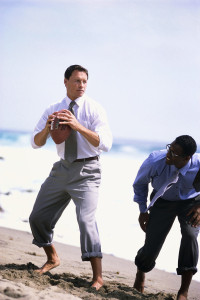Well, for starters, it is all about the team. I can’t think of any football team ever that won the season based on the efforts of just one player. From start to finish, each  play, offense or defense, requires participation from all the members of the team on the field.
play, offense or defense, requires participation from all the members of the team on the field.
Yes, an exceptional player can make an exceptional impact on the final score. However, the exceptional player cannot win the game or the season alone. Just not possible.
The same is true for human resources. Human resource professionals that approach what they do as a team are dramatically successful. Those that do not work as a team are remarkably mediocre.
The lone, exceptional human resource person can be perceived as successful in the short run, but, will not succeed in the long term. They will not last the season. Independent success is not sustainable.
So, how does a team work together? On our football team, we have a group of generalists and specialists. We have players who have well known strengths and well known weaknesses. We have one or more coaches. All the members on the team know a whole lot about each other.
The team knows how to address certain issues, how to respond to what the other team members bring to the field, how to get momentum and keep the momentum. And, above all, the team is constantly striving to improve. Each member has good days and not so good days. And the coach shares observations and training with the team. Members of the team are open to being coached. In fact, coaching is two way. The manager or coach shares observations and recommendations and the team member listens and asks questions. Together, they seek clarity and understanding and improvement.
Great teams function as a single unit; it is the team that is successful, not just one individual player. Players with ego issues either choose to conform to the team or self select out.
Margaret J. Wheatley, author of “Leadership and the New Science: Discovering Order in a Chaotic World”, writes “In America, we raised individualism to it highest expression, each of us protecting our boundaries, asserting our rights, creating a world that … leaves the individual suspended in glorious, but terrifying, isolation.”
Within a team, individual talent is very important, and the paradox is that individual talent serves the interest of the team. The team's goals are paramount. The team wins or loses. Not the individual.
I like tennis, too. Tennis is not the same kind of team sport; it is different from football. Are you a football player or a tennis player? Very small human resource offices, offices of one or two, may function well playing like tennis. For the rest of us, this style of play does not lead to sustainable success.
The best human resource teams are football teams. Don’t get hung up on winning or losing games, or playing offense or defense. Do focus on team roles, specialists, generalists, coaches, players integrating with other players, communication, plans, plays, practice, continuous improvement, cross-trained, special team players who deal with tough issues, options, and striving for excellence.
What does your human resource football team look like?
List out your players and their roles.
Indicate for each player their strengths and weaknesses.
Who are the generalists and who are the specialists? Do you have a special team set of players?
Do you review plays, the delivery of service? Do you do this to understand what went well to use again, and what did not go well to avoid in the future?
Latest posts by Philip Espinosa (see all)
- New Tires and Fear of Change - April 14, 2024
- Functional HR vs Organizational HR - February 18, 2024
- How is HR Like a Football Team - February 11, 2024












